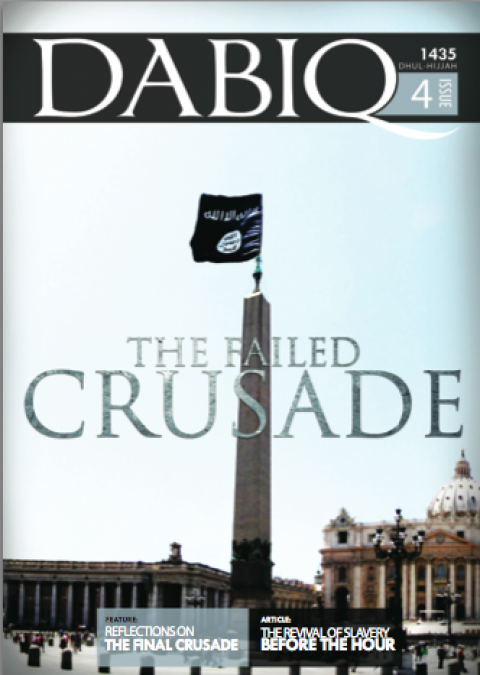- U.S. Military Social Media Accounts Apparently Hacked by Islamic State Sympathizers – Dan Lamothe (Washington Post)
- All Muslims Everywhere Murder French Satirists; Lone Wolf Acting Alone ‘Bombs’ NAACP, Alone – Doktor Zoom (Wonkette)
- What David Cameron Just Proposed Would Endanger Every Briton and Destroy the IT Industry - By Cory Doctorow (Boingboing)
- Mapping the World’s 4.3 billion Internet Addresses – Nancy Scola and Darla Cameron (Washington Post)
- The Internet of Things Plan to Make Libraries and Museums Awesomer – Satta Sarmah (Fast Company)
- The Charlie Hebdo Mohammed Cartoons: Media Outlets Shy Away or Take a Stand – Brian Stelter and Tom Kludt (CNN Money)
- The Glossy Magazines of the Islamic State – Scott Beauchamp (The Baffler)
U.S. Military Social Media Accounts Apparently Hacked by Islamic State Sympathizers
By Dan Lamothe
January 12, 2015
Washington Post
Hackers claiming allegiance to the Islamic State took control of the social media accounts of the U.S. military’s Central Command on Monday, posting threatening messages and propaganda videos, along with some military documents.
The command’s Twitter and YouTube accounts were eventually taken offline, but not before a string of tweets and the release of military documents, some of which listed contact information for senior military personnel. A Centcom spokesman confirmed their accounts were “compromised,” and said later that the accounts have been taken offline while the incident is investigated more.
All Muslims Everywhere Murder French Satirists; Lone Wolf Acting Alone ‘Bombs’ NAACP, Alone
By Doktor Zoom
January 7, 2015
Wonkette
The important thing to remember, of course, is that the terrorists in France are typical of all Muslims, while the terrorist in Colorado is a freakish violent lone wolf whose attempt to burn down a building with people inside of it is completely different from decent rightwing folks who merely identify the NAACP as the most racist organization in the USA.
What David Cameron Just Proposed Would Endanger Every Briton and Destroy the IT Industry
By Corey Doctorow
January 13, 2015
Boingboing
David Cameron says there should be no "means of communication" which "we cannot read" -- and no doubt many in his party will agree with him, politically. But if they understood the technology, they would be shocked to their boots.
Mapping the World’s 4.3 Billion Internet Addresses
By Nancy Scola and Darla Cameron
January 7, 2015
Washington Post
Internet protocol addresses are a bit like Social Security numbers, used to identify every device — from laptops to mobile phones to gaming systems — connected to the Internet. How many exist per person around the planet paints a picture of just how unevenly the Internet is distributed today.
The number of addresses per capita shows a lot about the degree to which a nation is capable of capitalizing on an information economy.
The Internet of Things Plan to Make Libraries and Museums Awesomer
By Satta Sarmah
January 7, 2015
Fast Company
In November, the Orlando Public Library implemented BluuBeam, an Orlando-based service that uses iBeacon technology to send location-triggered information to patrons. Visitors who download the app get an alert about library offers and events. So, for example, if you’re searching the third floor stacks for a Julia Child cookbook, you’ll receive a message about the library’s Cuisine Corner program that features cooking demos by local chefs.
BluuBeam and Capira Technologies, a New York company that also provides location-based services, are helping libraries develop better experiences for their patrons. Boston-based startup Spotzer has used the technology in museums to reinvent the way people interact with art.
The Charlie Hebdo Mohammed Cartoons: Media Outlets Shy Away or Take a Stand
By Brian Stelter and Tom Kludt
January 8, 2015
CNN Money
Most major media outlets are choosing not to republish the French magazine's satirical but highly controversial cartoons depicting the Prophet Mohammed.
But The Washington Post did choose to show one of the images in Thursday's print edition. "I think seeing the cover will help readers understand what this is all about," editorial page editor Fred Hiatt told The Post's Erik Wemple.
Several popular news web sites have also published slide shows of Charlie Hebdo cartoons.
Elsewhere, the news instinct to show the cartoons and express support for the slain journalists is countered by concerns about safety and sensitivity. Depictions of Mohammed are a strict taboo within Islam.
It's brought forth a fierce debate among journalists.
The Glossy Magazines of the Islamic State
By Scott Beauchamp
December 1, 2014
The Baffler
The glossy, English-language ISIS magazine Dabiq takes its title from an Armageddon myth set in a Northern Syrian town of the same name. As one might expect, the magazine serves as both recruitment tool for potential jihadist and public relations organ—it explains the group’s cause, and takes swipes at ideological opponents. It contains brutally honest propaganda, with pieces blending calls for the murder of unbelievers with the group’s boasts of offering medical assistance to children with cancer. The design is slick—sophisticated, even—full of maps and color photos. Each magazine, which can be found in digital edition on the Internet Archive, comes with an intricately designed cover that announces the particular theme of that issue.


Spread the word